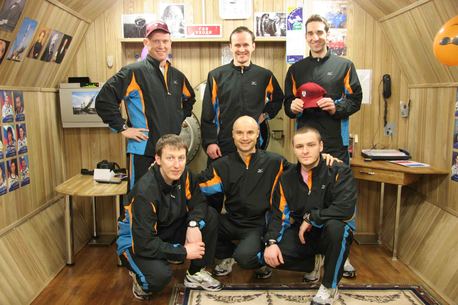First phase of isolation study ended
Mars500 crew safely 'landed'
 © ESA
|
The Mars500 crew halfway through their 105-day Mars mission simulation
It is anticipated that, in March 2010, the experiment will enter its second phase with a close-to-reality flight and simulated stay on Mars lasting 520 days. To this end, an artificial Martian surface is being constructed, on which three ‘cosmonauts’ will spend a total of 20 days.
An evaluation of the measuring results from the 'electronic nose' – a sensor system for detecting microbial contamination has been conducted and everyone involved has expressed satisfaction with the outcome. The apparatus functioned perfectly. As part of the 105-day study, no major changes to the artificial atmosphere in the module system were detected. As the next step several research institutes will now be working together on preparations for long-term application of the electronic nose on the International Space Station (ISS).
The participants have also been subjected to scientific experiments to assess the psychological and physiological effects of isolation. The experiments were proposed by research institutes in countries throughout Europe, including Germany, France, Italy, Belgium, Austria and the Netherlands, as well as in Russia and the United States.
The crew has grown some of their own food, such as salad leaves, radishes and cabbage, to supplement the astronaut-style pre-packaged meals. Any spare time has been spent reading, watching films and playing music and games together.
“We had an outstanding team spirit throughout the entire 105 days,” said Cyrille Fournier. “Living for that long in a confined environment can only work if the crew is really getting along with each other. The crew is the crucial key to mission success, which became very evident to me during the 105 days.”
All officials were very excited about the outcome of the mission and described it as a complete success.
German Aerospace Center
First phase of isolation study ended
Mars500 crew safely 'landed'
 © ESA
|
The Mars500 crew halfway through their 105-day Mars mission simulation
It is anticipated that, in March 2010, the experiment will enter its second phase with a close-to-reality flight and simulated stay on Mars lasting 520 days. To this end, an artificial Martian surface is being constructed, on which three ‘cosmonauts’ will spend a total of 20 days.
An evaluation of the measuring results from the 'electronic nose' – a sensor system for detecting microbial contamination has been conducted and everyone involved has expressed satisfaction with the outcome. The apparatus functioned perfectly. As part of the 105-day study, no major changes to the artificial atmosphere in the module system were detected. As the next step several research institutes will now be working together on preparations for long-term application of the electronic nose on the International Space Station (ISS).
The participants have also been subjected to scientific experiments to assess the psychological and physiological effects of isolation. The experiments were proposed by research institutes in countries throughout Europe, including Germany, France, Italy, Belgium, Austria and the Netherlands, as well as in Russia and the United States.
The crew has grown some of their own food, such as salad leaves, radishes and cabbage, to supplement the astronaut-style pre-packaged meals. Any spare time has been spent reading, watching films and playing music and games together.
“We had an outstanding team spirit throughout the entire 105 days,” said Cyrille Fournier. “Living for that long in a confined environment can only work if the crew is really getting along with each other. The crew is the crucial key to mission success, which became very evident to me during the 105 days.”
All officials were very excited about the outcome of the mission and described it as a complete success.
German Aerospace Center






